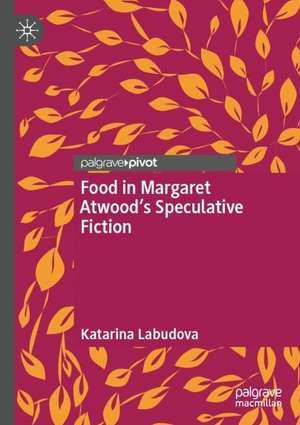Food in Margaret Atwood’s Speculative Fiction
Autor Katarina Labudovaen Limba Engleză Hardback – 11 noi 2022
Preț: 349.22 lei
Nou
Puncte Express: 524
Preț estimativ în valută:
66.87€ • 68.90$ • 56.12£
66.87€ • 68.90$ • 56.12£
Carte tipărită la comandă
Livrare economică 21 februarie-07 martie
Preluare comenzi: 021 569.72.76
Specificații
ISBN-13: 9783031191671
ISBN-10: 3031191676
Pagini: 146
Ilustrații: IX, 146 p. 1 illus.
Dimensiuni: 148 x 210 mm
Greutate: 0.34 kg
Ediția:1st ed. 2022
Editura: Springer Nature Switzerland
Colecția Palgrave Macmillan
Locul publicării:Cham, Switzerland
ISBN-10: 3031191676
Pagini: 146
Ilustrații: IX, 146 p. 1 illus.
Dimensiuni: 148 x 210 mm
Greutate: 0.34 kg
Ediția:1st ed. 2022
Editura: Springer Nature Switzerland
Colecția Palgrave Macmillan
Locul publicării:Cham, Switzerland
Cuprins
1 Fasting and Feasting: Food in Speculative Fiction Novels by Margaret Atwood.- 2 Women as White Meat: Chicken, Eggs and “Torsos Only” in The Handmaid’s Tale and The Testaments.- 3 Canned Food: Canned Death in Oryx and Crake.- 4 Corporate Cannibalism: The Year of the Flood.- 5 Eating and Story-telling: Maddaddam.- 6 Junk Food and Prison Food: The Heart Goes Last.- 7 Hybrid Genres: Festive Intertextuality and Hungry Reality.
Notă biografică
Katarina Labudova lectures on British and Canadian literature at the Department of English Language and Literature, Catholic University in Ruzomberok, Slovakia. She co-edited Presences and Absences: Transdisciplinary Essays (2013). She has published numerous articles on Margaret Atwood, Angela Carter, identity, monstrosity and the representations of the body and food in postmodern literatures.
Textul de pe ultima copertă
This book looks at Margaret Atwood’s use of food motifs in speculative fiction. Focusing on six novels – The Handmaid’s Tale and The Testaments, the Maddaddam trilogy, and The Heart Goes Last – Katarina Labudova explores the environmental, ecological, and cultural questions at play and the possible future scenarios which emerge for humanity’s survival in apocalyptic and post-apocalyptic conditions. Labudova argues that food has special relevance in these novels and that characters’ hunger, limited food choices, culinary creativity and eating rituals are central to Atwood’s depictions of hostile environments. She also links food to hierarchy, dominance and oppression in Atwood’s novels, and foregrounds the problem of hunger, both psychological or physical, caused by pollution and loss of contact with the natural and authentic. The book shows how Atwood’s writing draws from a range of genres, including apocalyptic fiction, science fiction, speculative fiction, dystopia, utopia, fairy tale, myth, and thriller – and how food is an important, highly versatile motif linking these intertextual threads.
Katarina Labudova lectures on British and Canadian literature at the Department of English Language and Literature, Catholic University in Ruzomberok, Slovakia. She co-edited Presences and Absences: Transdisciplinary Essays (2013). She has published numerous articles on Margaret Atwood, Angela Carter, identity, monstrosity and the representations of the body and food in postmodern literatures.
Caracteristici
Examines six popular novels by Margaret Atwood through the lens of food Explores environmental, ecological, and cultural issues in Atwood’s recent writing Uncovers Atwood’s use of genres, including apocalyptic, dystopian, and science fiction
